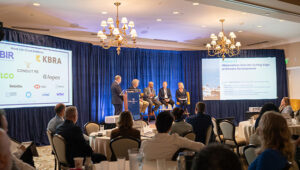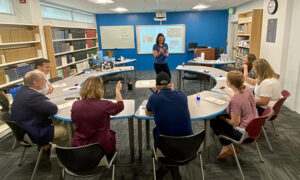BIOS Takes Part in Inaugural Bermuda Climate Summit

BIOS President and CEO William Curry was invited to speak on a panel about climate science and technologies at the Bermuda Climate Summit. Also joining the discussion was Arizona State University Vice President, and Vice Provost of the Julie Ann Wrigley Global Futures Laboratory, Pete Schlosser. The two-day event brought together leaders from business, science, and public policy sectors to explore solutions and opportunities to address climate risk protection. Photo by Nhuri Bashir/Burnt House Productions.
BIOS was well-represented this month at the first Bermuda Climate Summit, which began with a reception and dinner the evening of May 24 and continued with a conference the following day. The inaugural event was designed to “bring together leaders from business, science, and public policy sectors to explore solutions and opportunities” to address climate risk protection, according to the summit’s agenda.
BIOS faculty, leadership, and staff—including members of the education, development, and research departments—spoke in panel discussions, attended and led conference sessions, staffed a BIOS exhibit booth, and gave a post-conference tour of the Institute’s grounds and research spaces.
The event, held at the Rosewood Bermuda resort, was organized by the Bermuda Business Development Agency (BDA), in partnership with the Association of Bermuda Insurers and Reinsurers and Kroll Bond Reporting Agency, a global credit rating company. The summit followed the BDA-sponsored Bermuda Executive Forum, which made its first appearance since 2019 in New York City this past April, and the inaugural Bermuda Risk Summit, which was held at the Hamilton Princess in March 2022.
“We are thrilled with the success of the Bermuda Climate Summit, which brought together more than 170 invited delegates, including more than 70 distinguished overseas visitors,” said Stephen Weinstein, chair of the BDA as well as the BIOS board of trustees. “We are confident that Bermuda will emerge as a global capital for climate solutions, building on our decades of success in climate-driven reinsurance, and, importantly, the more-than 100-year legacy of BIOS.”
“Both Bermuda’s emerging climate finance and its adaptation to the broader challenges we face must be built on a foundation of scientific understanding and innovation,” he said. “The extraordinary team at BIOS and its unique location in the world’s ocean, all enhanced by our exciting partnership with Arizona State University (ASU), ensure that BIOS will play a critical role in the years ahead. We look forward to welcoming our BIOS and ASU family back to next year’s summit.”

Kaitlin Noyes, BIOS director of education and community engagement, gave a hands-on presentation to delegates. The two activities demonstrated core skills taught in many of the Institute’s education programs, including loading a gel plate used to separate molecules of DNA, RNA, and protein, and building a simple electrical circuit. These fundamental skills relate directly back to the research investigations taking place at BIOS, as well as the technologies used to understand what is taking place on, in, and under the ocean.
ASU President Michael Crow attended and gave a presentation on the recent partnership between the university and BIOS. Crow highlighted how the two organizations will advance transdisciplinary research into climate science, while working with international and Bermuda-based partners to translate these findings into actionable next-steps in areas such as blue economics and climate mitigation, as well as issues of diversity, equity, and inclusion in university-level education.
Weinstein’s roles during the summit included serving as moderator for a panelist session titled “Observations from the Cutting Edge of Climate Developments.” Panel speakers included William Curry, BIOS president and CEO; Mark Guishard, director of the Bermuda Weather Service and BIOS adjunct faculty member; and Peter Schlosser, vice president and vice provost for the Julie Ann Wrigley Global Futures Laboratory at ASU. The session’s topics included the types of scientific research and applied technologies used to understand the scale and pace of climate challenges, as well as what technological developments are on the horizon.
“Some of the biggest uncertainties we’re confronting with climate change involve potential impacts on ocean waters, not just changing temperature and acidity, but what this means for hurricane formation, coastal flooding, even the survival of plankton that live at the base of the marine food chain,” Curry said.
“Nearly seven decades of data from BIOS time-series programs have underpinned hundreds of international research investigations, and led to a more scientific approach to climate risk initiatives in partnership with the local reinsurance industry,” he said. “Now, with a suite of more sophisticated oceanographic tools at our fingertips, such as autonomous gliders, we can make increasingly diverse and accurate measurements of ocean change.”
Following the summit, on May 26, Weinstein brought a group of international summit delegates to the Institute for an informational tour. Among the guests was Samantha Medlock, senior counsel for the U.S. House Select Committee on the Climate Crisis; Bronwyn Claire, senior program manager for ClimateWise at the Cambridge Institute for Sustainability Leadership; Nick Charman, chairman of Elbow Beach Capital; and David Hart, CEO of the BDA. Curry began by providing an overview of BIOS before delegates had the opportunity to meet with faculty and staff to learn about ongoing research and education programs, particularly as they relate to climate.
Over the course of the morning they met with oceanographer Ruth Curry, who directs the Mid-Atlantic Glider Initiative and Collaboration (MAGIC) program, as well as BIOS faculty members Eric Hochberg, a reef systems ecologist, and Yvonne Sawall, a benthic ecologist.
Kaitlin Noyes, BIOS director of education and community engagement, also gave a hands-on presentation. She spoke about how BIOS’s Ocean Academy has been curating accessible curriculum-aligned lessons, rooted in the Institute’s global research programs, and delivering experiential learning opportunities to Bermudian students.
“Research is fueled by competency in a core suite of laboratory, field, and analytical skills,” Noyes said. “Building an innovation mindset from an early age will be a key component of the skillset required for solving complex environmental problems such as climate change.”
